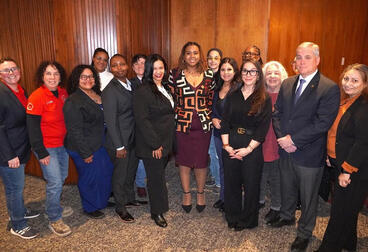(L. to r:) Rachel Bryan from the IBEW Civic and Community Engagement Department, Theresa Moss King, President at Florida Building and Construction Trades out of Local 915 IBEW, Assistant to the IBEW International President Sherilyn Wright, Cindy O‰ÛªMeara, President of Local 1362 of the IBEW and Erin Sullivan, Shop Steward Local 3, IBEW.
Every year the United Nations Commission on the Status of Women (CSW) convenes a two-week meeting to assess the previous year’s progress and set the agenda for the coming year. CSW is the principal global intergovernmental body exclusively dedicated to the promotion of gender equality and the empowerment of women. At the same time a forum of non-governmental organizations (NGO) gathers to discuss and collaborate on women’s issues. This year the AFL-CIO participated in these events by piloting a Women’s Global Leadership Program. Fifty participants from across the country were selected to participate in a four-day conference in New York City. Six women from the IBEW attended.
The four days began with a meet and greet in which the room was filled with women trailblazers ranging from the AFL-CIO Secretary-Treasurer and IBEW member Liz Shuler, Assistant to the IBEW International President Sherilyn Wright, Rachel Bryan from the IBEW Civic and Community Engagement Department, IBEW Sister Theresa Moss King, President of the Florida Building and Construction Trades Council out of Local 915 and Cindy O’Meara, President of Local 1362 of the IBEW in Iowa and Erin Sullivan, Local 3, IBEW.
The following days were packed with learning exercises on the global economy. One of the exercises was researching an economic event timeline, identifying the causes and the rule makers. The final portion of the exercise was looking at what happened as a result of these economic events and how the collective action changed the public’s view. We also discussed how the new global economy affects us both as workers and consumers and how collective action and most importantly how collective inaction affects us all.
We attended a couple of side session panel discussions in which we heard from women around the world speak on labor issues in their countries. One woman worked at a Nike factory in Thailand. She spoke of how horrible the conditions were in the plant and how on one particular day Nike refused to pay the plant workers saying the quality of the product was not up to their standards. The workers were so fed up they decided to walk out. When the time came for action, the women walked out of the factory, but the young men stayed because they feared losing their jobs. The factory owners locked the young men into the factory. After three days they spoke with the women and were able to come up with mutually agreed upon items that would benefit the workers. Kalpona Akter, Bandladesh Centre for Worker Solidarity spoke about her organizing campaign and how after she organized the plant she was fired for her efforts. She spoke of how the company made a mistake by firing her. She said “When I worked for the factory I helped to negotiate a contract for 1,600 workers in the factory. When they fired me I began my work at the Solidarity Center and I negotiate contracts for 4.3 million workers.”
We addressed domestic issues within this global framework. According to the Center for Economic and Policy Research, if current trends of women joining the work force and joining unions continues, women are on track to become a majority of the union workforce in 2023. According to the Institute for Women’s Policy Research in 2014, female full-time workers made only 79 cents for every dollar earned by men, a gender wage gap of 21 percent. So why are these numbers important to a membership which is predominantly male? How does it directly affect men? As husbands and fathers of women we can bring it back to, “Am I ok with my wife making 21% less than her male co-worker? Am I ok with my daughter paying the same price for a college degree only to come out with the same training and having to work 21% longer in order to catch up? The next Equal Pay Day is Tuesday, April 12, 2016. This date symbolizes how far into the year women must work to earn what men earned in the previous year. Most importantly if a woman has to work 21% longer, this is time taken away from her family.
Another issue that affects men just as much as women, is the gender wage effect. As more and more women enter into the workforce out of choice or necessity it creates a bigger pool of labor. Women have now surpassed men in obtaining higher education. When companies are faced with hiring they look at the bottom line. If they can hire a woman with the same qualifications and sometimes even higher qualifications for less it now compromises the male wage. For instance, in a field like medicine, which used to be male-dominated, the median wage has gone down as more and more women went to school and entered into the medical field. So now in order for men to compete with women they have to accept lower wages.
The gender wage problems are not good for women or men and change is coming. That change will be determined by those who show up. As we move into a new global workforce we all need to remember that workers’ rights, working wages, workers’ benefits, workplaces free from harassment and job safety should have no gender differences. Until we look at workers not just here in America, but globally as workers, we can’t truly challenge the corporate system, which has had so much success in dividing us. Until we see that all worker’s rights affect us all, we can’t stand up and take collective action. The only way to race to the top is through collective advocacy and realizing that workers’ rights are human rights. Until we are willing to take out the “She” and He” and replace them with “We” can we hope for a better tomorrow for our wives, our daughters, our husbands and sons and for ourselves?


